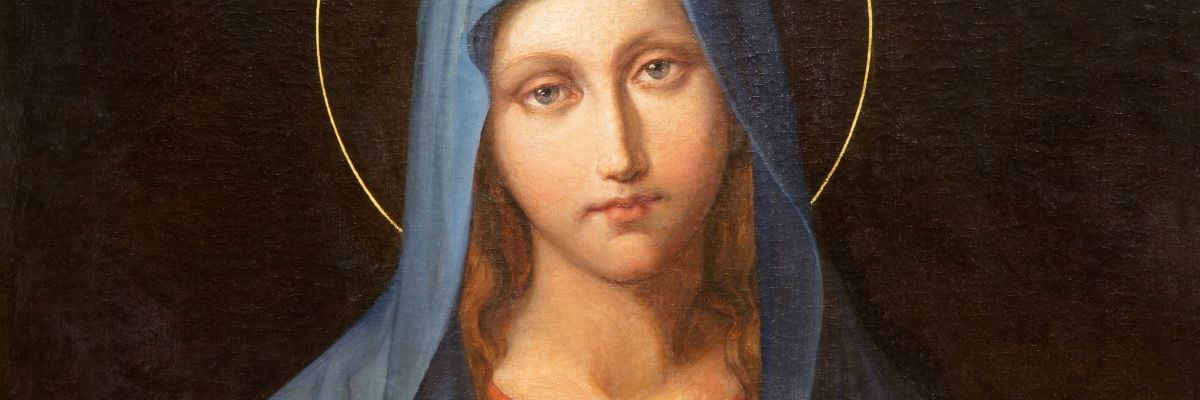
Those who deny Mary’s perpetual virginity most commonly refer to two texts:
- Matthew 13:55-56: Is not this the carpenter’s son? Is not his mother called Mary? And are not his brethren James and Joseph and Simon and Judas? And are not all of his sisters with us?
- Matthew 1:24-25: And Joseph rising up from sleep, did as the angel of the Lord had commanded him, and took unto him his wife. And he knew her not till she brought forth her firstborn (Gk. prototokon) son: and he called his name Jesus. (Douay-Rheims)
A surface reading of these passages seems problematic. If Jesus had “brothers” and “sisters,” would not Mary have had other children? If Jesus was Mary’s “firstborn,” would there not be at least a second-born? And if “he knew her not till,” did he not then “know her” at some point? We’ll begin with Matthew 13:55-56.
Oh, Brother!
First, we must understand that the term brother has a wide semantic range in Scripture. It can mean a uterine brother, an extended relative, or even a spiritual brother. In Genesis 13:8 and 14:12, we read of one example of brother being used to describe an extended relationship: Abraham and Lot. Though they were actually uncle and nephew, they called one another “brother.” Moreover, in the New Testament, Jesus told us to call one another “brothers” in Matthew 23:8. The passage obviously does not mean to suggest that all Christians have the same physical mother.
Second, if we examine more closely the example of James, one of these four “brothers of the Lord” mentioned in Matthew 13:55, we discover him to be a cousin or some other relative of Jesus rather than a uterine brother. For example, Galatians 1:18-19 informs us: “Then after three years I [Paul] went up to Jerusalem to visit Cephas, and remained with him fifteen days. But I saw none of the other apostles except James the Lord’s brother.”
Notice, the “James” of whom Paul was speaking was both a “brother of the Lord” and an “apostle.” There are two apostles named James among the 12. The first James is revealed to be a “son of Zebedee.” He most likely would not be the “James” referred to because according to Acts 12:1-2 he was martyred very early on. Even if it was him, his father was named Zebedee, not Joseph.
Paul more likely is referring to the second James who was an apostle, according to Luke 6:15-16. This James is revealed to have a father named Alphaeus, not Joseph. Thus, James the apostle and Jesus were not uterine brothers. Easy enough. Some will argue, however, that this “James” was not an apostle or that he was not one of the original 12. Though this is a possibility—others in the New Testament, such as Barnabas in Acts 14, are referred to as “apostles” in a looser sense—the argument from Scripture is weak. When Paul wrote about going “up to Jerusalem” to see Peter, he was writing about an event that occurred many years earlier, shortly after he had converted. He was basically going up to the apostles to receive approval lest he “should be running or had run in vain.” It would be more likely he would have here been speaking about “apostles” (proper), or “the twelve.”
But for those inclined to argue the point, the Catechism of the Catholic Church uses another line of reasoning:
The Church has always understood these passages as not referring to other children of the Virgin Mary. In fact James and Joseph, “brothers of Jesus,” are the sons of another Mary, a disciple of Christ, whom St. Matthew significantly calls “the other Mary.” They are close relations of Jesus, according to an Old Testament expression. (CCC 500)
The Catechism here refers to the fact that 14 chapters after we find the “brothers” of the Lord listed as “James, Joseph, Simon and Judas,” we find “James and Joseph” mentioned again, but this time their mother is revealed as being named Mary, but not Mary, the Mother of Jesus. We can conclude that “James and Joseph” are “brothers” of Jesus, but they are not uterine brothers.
But what about Matthew 1:24-25, and the claim Jesus was Mary’s “firstborn son” and that Joseph “knew her not until” Christ was born? Does Matthew here teach that Mary had other children?
Exodus 13:1-2 reveals something very important about the firstborn in Israel: “The Lord said to Moses, ‘Consecrate to me all the firstborn; whatever is the first to open the womb among the people of Israel, both of man and beast, is mine.’”
The “firstborn” were not given the title because there was a “second-born.” They were called “firstborn” at birth. Jesus being “firstborn” does not require that more siblings be born after him.
Until Then
Scripture’s statement that Joseph “knew [Mary] not until she brought forth her firstborn” would not necessarily mean they did “know” each other after she brought forth Jesus. Until is often used in Scripture as part of an idiomatic expression similar to our own usage in English. I may say to you, “Until we meet again, God bless you.” Does that necessarily mean after we meet again, God curse you? By no means. A phrase like this is used to emphasize what is being described before the until is fulfilled. It is not intended to say anything about the future beyond that point. Here are some biblical examples:
- 2 Samuel 6:23: And Michal the daughter of Saul had no child to (until) the day of her death. (Does this mean she had children after she died?)
- 1 Timothy 4:13: Until I come, attend to the public reading of scripture, to preaching, to teaching. (Does this mean Timothy should stop teaching after Paul comes?)
- 1 Corinthians 15:25: For he (Christ) must reign until he has put all his enemies under his feet. (Does this mean Christ’s reign will end? By no means! Luke 1:33 says, “he will reign over the house of Jacob forever and of his kingdom there shall be no end.”)
In recent years, some have argued that because Matthew 1:25 uses the Greek words heos hou for “until” whereas the texts I mentioned above from the New Testament use heos alone, there is a difference in meaning. The argument goes that Heos hou indicates the action of the first clause does not continue. Thus, Mary and Joseph “not having come together” would have ended after Jesus was born.
The problems with this theory begin with the fact that no available scholarship concurs with it. In fact, the evidence proves the contrary. Heos hou and heos are used interchangeably and have the same meaning. Acts 25:21 should suffice to clear up the matter: “But when Paul had appealed to be kept in custody for the decision of the emperor, I commanded him to be held until (Gk. heos hou) I could send him to Caesar.”
Does this text mean that Paul would not be held in custody after he was “sent” to Caesar? Not according to the biblical record. He would be held in custody while in transit (see Acts 27:1) and after he arrived in Rome for a time (see Acts 28:16). The action of the main clause did not cease with heos hou.
The Affirmative Argument
Now let’s look at some reasons to believe in Mary’s perpetual virginity. Among the many we could examine, we will briefly consider three:
1. In Luke 1:34, when Mary was told by the angel Gabriel that she was chosen to be the Mother of the Messiah, she asked the question, literally translated from the Greek, “How shall this be since I know not man?” This question makes no sense unless Mary had a vow of virginity.
When we consider that Mary and Joseph were already “espoused,” according to verse 27 of this same chapter, we understand Mary and Joseph already have what would be akin to a ratified marriage in the New Covenant. They were married. That would mean Joseph would have had the right to the marriage bed. Normally, after the espousal the husband would go off and prepare a home for his new bride and then come and receive her into his home where the union would be consummated. This is precisely why Joseph intended to “divorce her quietly” (Mt 1:19) when he later discovered she was pregnant.
This background is significant because a newly married woman would not ask the question “How shall this be?” She would know—unless, of course, that woman had taken a vow of virginity. Mary believed the message, but wanted to know how this was going to be accomplished. This indicates she was not planning on the normal course of events for her future with Joseph.
2. In John 19:26, Jesus gave his Mother to the care of John even though by law the next eldest sibling would have the responsibility to care for her. It is unthinkable that Jesus would take his Mother away from his family in disobedience to the law.
Some claim Jesus did this because his brothers and sisters were not there. They had left him. Thus, Jesus committed his Mother to John, who was faithful and present at the foot of the cross. This claim betrays a very low and unbiblical Christology. As John tells us, Jesus “knew all men” (cf. Jn 2:25). If James were his uterine brother, Jesus would have known he would be faithful along with his “brother” Jude. The fact is Jesus had no brothers and sisters, so he had the responsibility, on a human level, to take care of his Mother.
3. Mary is depicted as the spouse of the Holy Spirit in Scripture. In Luke 1:34, when Mary asks the angel how she will conceive a child, the angel responds: “The Holy Spirit will come upon you, and the power of the Most High will overshadow you; therefore the child to be born will be called holy, the Son of God.”
This is nuptial language hearkening back to Ruth 3:8, where Ruth said to Boaz “spread your skirt over me” when she revealed to him his duty to marry her according to the law of Deuteronomy 25. When Mary became pregnant, Joseph would have been required to divorce her because she would then belong to another (see Dt 24:1-4; Jer 3:1). But when Joseph found out that “the other” was the Holy Spirit, the idea of his having conjugal relations with Mary was not a consideration.
Mary’s Protector
An obvious question remains: Why did St. Joseph then “take [Mary] his wife” according to Matthew 1:24 if she belonged to the Holy Spirit?
The Holy Spirit is Mary’s spouse, but Joseph was her spouse and protector on this earth for at least two obvious reasons. First, as Matthew points out in his genealogy in chapter 1, Joseph was in line to be a successor of David as King of Israel. Thus, if Jesus was to be the true “son of David” and king of Israel (see 2 Sm 7:14, Heb 1:5, Rv 19:16, 22:16), he needed to be the son of Joseph. As the only son of Joseph, even though adopted, he would have been in line for the throne.
Also, in a culture that did not take too kindly to espoused women getting pregnant by someone other than their spouse, Mary would have been in mortal danger. So Joseph became Mary’s earthly spouse and protector as well as the protector of the child Jesus.



